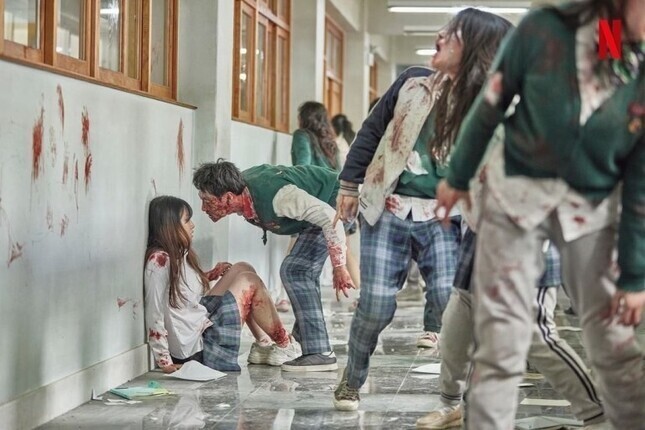hankyoreh
Links to other country sites 다른 나라 사이트 링크
[Column] Facing our fear of the “welfie” in “All of Us Are Dead”


While watching the Netflix drama “All of Us Are Dead,” I flinched at the expression “welfie” — “gisaengsu” in Korean. Used by Na-yeon to classmate Gyeong-su after she narrowly escapes to the school broadcasting studio, the term is supposedly short for “welfare recipient,” or “gicho saenghwal sugeupja” in Korean.
Amid the panic, Na-yeon sees Gyeong-su’s injured hand and suspects that he’s been bitten by a zombie. She already disapproves of Gyeong-su for cutting through her apartment complex to get to school even though he lives in a low-income rental, so her everyday prejudice quickly merges with the fear of contagion, turning her suspicion into conviction. After going to see Gyeong-su, quarantined in the recording booth, Na-yeon purposely infects him with the zombie virus instead of apologizing, all the while saying that it’s unfair that she was cornered by her friends because of someone as low as him.
When I searched “gisaengsu” online, I found quite a lot of people asking what it meant. Many said the term made them think of the Japanese animated TV series “Parasyte,” as the show is called “Gisaengsu” in Korean. I was relieved. The expression hadn’t been popularized yet as a slur. But still, the expression can be found quite frequently in some online communities, to paint poverty as the result of individual incompetence and to denigrate welfare recipients’ supposed “beggarly spirit.” This is happening in a country where the National Basic Living Security Act declared welfare the legitimate right of eligible recipients since its establishment 20 years ago.
The expression “gisaengsu” reminded me of a moment of bewilderment during a conversation I had with a student a few years ago. After mentioning that they received benefits, the student requested anonymity. “I won’t be safe if this gets out,” they said. I never imagined the word “safe” to come up in that moment.
Since its democratization, South Korea has witnessed rapid progress in its education and institutions related to human rights. Though an anti-discrimination law prohibiting discrimination based on any reason including sex, age, place of origin, and regional affiliation is still up in the air, its legislation is broadly supported in South Korea. But how should one interpret the words of a student that they “won’t be safe” if they are identified as living in poverty?
Spanish political philosopher Adela Cortina has said hostilities against refugees and immigrants always involve hate and fear against the poor, which she called “aporophobia.” As involuntary poverty is a matter of neither personal identity nor personal choice, she distinguished aporophobia from other types of hate and rejection.
Here’s an example. I’ve become accustomed to labels like “non-disabled” and “heterosexual” after being exposed to teachings that problematize the customary view that disability and homosexuality are nonnormative. However, I’ve never applied that line of thought to poverty and considered expressions like “non-poor,” nor have I been taught to think that way. Is it because economic growth and development equal accomplishment in a capitalist world, its ideology as natural as the air we breathe? In our world, wishing wealth upon another is as common a New Year’s greeting as wishing good health. Hence, poverty is simply misfortune, a mere figure in a statistic.
Would denouncing and punishing people seized by aporophobia be enough, then? That’s one of the things that happens in “All of Us Are Dead.” The scene in which Nam-ra calls Na-yeon a “murderer” and the camera scans Na-yeon’s friends glaring at her in disgust provides some level of satisfaction to the viewers. However, when Na-yeon sets off on her own, thinking she’s been abandoned by everyone, Ms. Park, the English teacher, goes after her, sacrificing herself to the zombies to protect Na-yeon. Ms. Park tells Na-yeon, “You were scared. So were the others. That’s all. So make sure you go back to them later. Go to them and tell them, and tell Gyeong-su, that you’re sorry [. . .] Stay alive. Stay alive and help your friends.”
Ms. Park’s last words before turning into a zombie move Na-yeon, who takes courage and gathers food to give to her friends. That’s why it’s so frightening and pitiful when the camera zooms into the blood pouring down her shoes when Na-yeon is bit by Gwi-nam.
In a capitalist world where systematic inequality has taken root, hate against the poor should never come to pass. However, if the stigmatization of poverty is the natural outcome of a capitalist world that places productivity on its uppermost pedestal, the majority of people would be its accomplice and co-conspirator. Simply falling into a fit of rage at the expression “gisaengsu,” berating the virus of hate, and improvising a quick fix isn’t the way to go.
Fear of losing one’s social status, sense of relative deprivation, and survivalist competition instigating discrimination against the vulnerable isn’t a new phenomenon. That’s why Ms. Park’s role in creating an opportunity for redemption for Na-yeon even in an emergency is so special — though it’s a burdensome one in this digital age, when issues are too swiftly problematized and responded to.
Please direct questions or comments to [english@hani.co.kr]

Editorial・opinion
![[Column] Season 2 of special prosecutor probe may be coming to Korea soon [Column] Season 2 of special prosecutor probe may be coming to Korea soon](https://flexible.img.hani.co.kr/flexible/normal/500/300/imgdb/original/2024/0426/3317141030699447.jpg) [Column] Season 2 of special prosecutor probe may be coming to Korea soon
[Column] Season 2 of special prosecutor probe may be coming to Korea soon![[Column] Park Geun-hye déjà vu in Yoon Suk-yeol [Column] Park Geun-hye déjà vu in Yoon Suk-yeol](https://flexible.img.hani.co.kr/flexible/normal/500/300/imgdb/original/2024/0424/651713945113788.jpg) [Column] Park Geun-hye déjà vu in Yoon Suk-yeol
[Column] Park Geun-hye déjà vu in Yoon Suk-yeol- [Editorial] New weight of N. Korea’s nuclear threats makes dialogue all the more urgent
- [Guest essay] The real reason Korea’s new right wants to dub Rhee a founding father
- [Column] ‘Choson’: Is it time we start referring to N. Korea in its own terms?
- [Editorial] Japan’s rewriting of history with Korea has gone too far
- [Column] The president’s questionable capacity for dialogue
- [Column] Are chaebol firms just pizza pies for families to divvy up as they please?
- [Column] Has Korea, too, crossed the Rubicon on China?
- [Correspondent’s column] In Japan’s alliance with US, echoes of its past alliances with UK
Most viewed articles
- 1Is Japan about to snatch control of Line messenger from Korea’s Naver?
- 2‘We must say no’: Seoul defense chief on Korean, USFK involvement in hypothetical Taiwan crisis
- 3[News analysis] Using lure of fame, K-entertainment agency bigwigs sexually prey on young trainees
- 4Will NewJeans end up collateral damage in internal feud at K-pop juggernaut Hybe?
- 5‘Weddingflation’ breaks the bank for Korean couples-to-be
- 6Division commander ordered troops to enter raging flood waters before Marine died, survivor says
- 7No good, very bad game for Korea puts it out of Olympics for first time since 1988
- 8“Korea is so screwed!”: The statistic making foreign scholars’ heads spin
- 9The dream K-drama boyfriend stealing hearts and screens in Japan
- 10[Column] The clock is ticking for Korea’s first lady